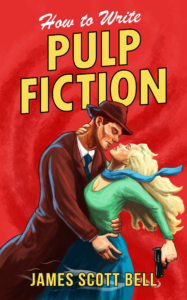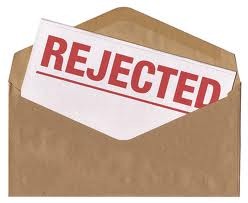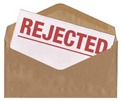Any writer who puts their work “out there”, either submitting to various markets, or by self-publishing on various platforms, will be familiar with rejections. They go with the territory. I earned my first rejection letter forty years ago (!) when I made my first short story submission while still in college, to the Magazine of Fantasy and Science Fiction. It was a form rejection.
Two years later, I received a personal rejection from Amazing Stories Magazine for my story, “Love Through Eating Illegals,” which posited a future where chocolate had been banned because of a particular chemical found in cocoa, and the anti-hero of the story was burgling houses trying to find hidden caches. (I’ll admit the idea of a world where chocolate is banned is almost too horrible to contemplate.)
The rejection letter, from editor George Scithers, spelled out why he rejected the story—namely, there wasn’t much of a story and what there was didn’t really work. He was absolutely right. It took me many more years and much study of fiction craft and a lot more writing to finally earn my first story acceptance for a story called “Dead Wife Waiting,” but those early rejection letters started me on the path.
Self-publishing has its own form of rejection, namely a lack of sales, readers, and/or reviews, which, like any kind of publishing rejection, can be learned from.
Today’s Words of Wisdom tackles rejection, and shows how it can help you become a better writer. As usual, the full articles are linked at the end of their respective excerpts and well worth reading in full. I hope they inspire you and also start a discussion here about turning rejection to your advantage.

I’m familiar with rejection. Before my first novel was published I wrote four books that went nowhere. I received rejection letters from every major publisher in the industry and a hell of a lot of minor ones too. (And because this record of rejection dates back to the late Eighties, some of them were actual letters rather than e-mails. Typed on paper, for crying out loud!) The rejections that hurt the most were of the “It’s good, but…” variety. You know what I mean: It’s well-written, but I didn’t like the characters. It starts well, but I lost interest. I liked the book, but I didn’t love it. Or the worst: I loved the book, but it’s not right for us.
I hated those letters. My reaction was: If you like it so much, why don’t you just publish it? In my disappointment, I wondered whether the compliments were sincere. Perhaps the editors actually disliked the book but were trying to soften the blow. In a perverse way, I almost hoped that the praise was false. If it was genuine, that meant I’d come close to success but fallen short, which was more frustrating than missing by a long shot.
In retrospect, I realize how wrongheaded my reasoning was. First of all, I’ve learned that book editors are outrageously busy people. The notion that they’d take the time to invent a compliment seems so ludicrous now. I’ve also realized there are many valid reasons for rejection that have nothing to do with the quality of the novel. The publisher may have too many books on its list already. Or perhaps the imprint rejects a manuscript because it just published something similar and it didn’t sell very well. Publishing is a business, after all. An editor can afford to make a few money-losing bets, but not too many.
But my worst mistake was ignoring the obvious message of those letters: You’re getting close! You should keep trying! Now I see that receiving one of those “It’s good, but…” rejections is the equivalent of hitting the green outer ring of the bull’s-eye on a dartboard. If you can consistently hit that ring, then it’s just a matter of time before you’ll land within the inner circle and win the big prize.
Mark Alpert—February 9, 2013
Before self-publishing became viable, when you got rejected it truly tested your mettle. First novels almost never got picked up by an agent or publisher. And most of the time they never told you why. Just something like, “Does not fit our needs at this time.”
This would sting for a few days. Maybe you’d throw things around and think, “I just don’t have what it takes!” But if you were a real writer you’d get back to work. You’d figure out (with help from others) what was wrong with your writing. You’d study the marketplace. If you were wise, you’d study the craft, too. Maybe join a critique group, go to a conference or two or three. Invest in yourself.
Most important of all, you would continue to write. And then maybe two or three or five years later an agent would take a chance on you. And another year or two later, you might land that first contract. And then eighteen months later, your book would hit the stores.
And you would discover the truth behind Martin Myers’ keen observation: “First you’re an unknown, then you write one book and you move up to obscurity.”
Yet all that rejection and heartache and sticktoitiveness made you a better writer. Which, in turn, increased your chances of having an actual career.
So if you’re a brand new writer with a brand new novel (and a lot of you will be at the end of this NaNoWriMo month), go out and get some rejection. Use the beta reader grinder system. Seek open and honest opinion. Take the chip off your shoulder. Consider hiring a freelance editor. Start thinking like a business. Set up quality controls.
Heck, spend a month studying our library of first-page critiques. Talk about a concentrated course on storytelling!
Sure, you can skip all that and toss your novel up on Amazon, where it will get rejected by the people you most need—readers.
Or you can be a little patient, work hard, listen and learn and improve, and greatly increase your chances of success.
James Scott Bell—November 12, 2017
There is a hierarchy of rejections–a ladder to climb:
Rung #1 – Unsigned form letter: “This does not meet our needs at this time.”
Rung #2 – Unsigned form letter: “This does not meet our needs at this time but please try us again.”
Rung #3 – Same form letter with a handwritten note (unsigned): “This is good. Do you have anything else?”
Rung #4 – Personal letter: “Good story but too similar to one we recently published. I like your writing. Send more.” Actual editor’s signature.
Rung #5 – Personal letter signed with editor’s first name. Now we’re buddies.
With today’s electronic submissions, the process is similar, just faster and cheaper without the cost of postage and printing.
But the process still requires climbing the rungs.
Finally you clamber onto an exciting but scary roof with a steep pitch. The editor/agent likes the sample chapter and asks for the whole manuscript. Get a toehold on the rain gutter.
A month or five later, the rejection says: “This is good BUT…”
Fill in the blank with:
“Characters felt inconsistent.”
“The climax didn’t live up to expectations.”
“I just didn’t love it enough.”
Etc.
Slide down the roof a bit but hang on with fingernails.
Rewrite and submit more. Inch up the shingles.
“All the editors loved it but the marketing department doesn’t think they can sell it.”
At last, you reach the peak of the roof when you receive a long, detailed, personal letter with specific suggestions.
In December, I received the most beautiful rejection of my entire career (and I’ve received hundreds!). I couldn’t even be unhappy when I read the following:
“Several of us read it and we all enjoyed your fresh, exciting take on a thriller—particularly the way you used the genre to explore the very real issue of elder fraud. There are several striking scenes that are seared in my memory (especially that late-night rescue in the snowstorm!). We thought you developed Tawny and Moe’s relationship with great sensitivity and nuance, and this in turn made Moe’s shifts between lucidity and violence a more emotional experience for readers. Unfortunately, we had difficulty connecting as deeply to Tawny—it often felt like she was kept at a remove from us. For this reason, despite our admiration for your writing and the compelling and dynamic world you’ve created, we don’t think we’re the right publisher for your book. I’m sorry not to have better news. Thank you so much for the opportunity to read and consider STALKING MIDAS, and best wishes in finding the right home for it.”
It felt like the editor had sent me a dozen roses!
When you tell civilians (non-writers) about the wonderful rejection you received, they usually draw their chins back and look down their noses. “You got rejected and you’re happy?”
Only other writers understand the irony of a rave rejection.
What do rejections really mean?
You’re in the game.
What do rave rejections mean?
Publication is in your future.
Debbie Burke—September 3, 2019
***
Now it’s your turn.
- What have you learned from receiving a rejection, and how have you used it to improve your writing?
- Have you ever received a “rave rejection,” and how did it affect your outlook?
- Any advice on handling rejection?








